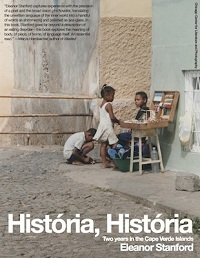What in God’s Name is a Hypermodern Book?
A number of Peace Corps writers have asked, “what is a ‘Hypermodern Editions’ after I posted the recent blog item on História, História by Eleanor Stanford (Cape Verde 1998-2000) and wrote that it was published as a “Hypermodern Edition, only 100 pages written on pages 5.75 by 4.38 inches (or a twice-folded sheet of typing paper).
They must have thought I knew what I was talking about. Hello?
So I asked Jason Pettus, the publisher at Chicago Center for Literature and Photography, and he emailed me that “Hypermodern Editions is just a blanket term for all their handmade books, to differentiate them from the ebooks and the trade paperbacks we’re going to start doing in 2014. The term “hypermodern” comes from the world of book collecting, and refers to any collectible book less than 30 years old.”
I also ask him about the pricing of this book, i.e., as it is free as an ebook. He wrote back that it was free for a number of reasons. “It increases readership dramatically, which then directly increases the amount of press we have written about us, the number of reviews that get written online, and the number of people who come out to that author’s live appearances. I also am one of those people who feel that piracy of digital goods like books and music is nearly impossible to enforce, so we choose to preempt the pirates by simply offering the book for free download from the start, then gearing our business model towards the things that digital pirates cannot reproduce, like the handmade paper books, live author appearances, awards, grants, etc. The version at Amazon for $4.99 is just for those who find the fee a good tradeoff for getting to have the book download directly to their device, as well as Amazon-centric customers who would’ve otherwise not heard of us.”
 História, História is the 13th book that they have released this way. “And it’s been proven over and over that we don’t actively lose any money by doing so,” Jason writes, and then went onto say, “Those who were going to buy a paper copy anyway by and large still buy it, while those who download the free ebook are mostly people who would’ve otherwise not read it at all. And in the meanwhile, total readership of each book often skyrockets into the thousands, we receive a lot more attention as a result, and the sheer novelty of the plan gets us a certain amount of media notices just on its own. It’s been a win-win situation for both us and our customers, and we plan on continuing this policy into the foreseeable future.”
História, História is the 13th book that they have released this way. “And it’s been proven over and over that we don’t actively lose any money by doing so,” Jason writes, and then went onto say, “Those who were going to buy a paper copy anyway by and large still buy it, while those who download the free ebook are mostly people who would’ve otherwise not read it at all. And in the meanwhile, total readership of each book often skyrockets into the thousands, we receive a lot more attention as a result, and the sheer novelty of the plan gets us a certain amount of media notices just on its own. It’s been a win-win situation for both us and our customers, and we plan on continuing this policy into the foreseeable future.”
If you have been trying to publish and or just thinking about the business of publishing, you have noticed a few trends, one of which is the demise of commercial houses as well as the demise of academic publishing ventures, the dramatic increase of ebooks in all  formats, and the slow and interesting development of small publishing houses like Chicago Center for Literature and Photography that has been started by Jason Pettus. We wish him well.
formats, and the slow and interesting development of small publishing houses like Chicago Center for Literature and Photography that has been started by Jason Pettus. We wish him well.
(Maybe you should send him your next book….just a thought…)
John, you’re the Man. The Peace Corps Writer personified. Thanks for your time and consideration of us to shy to ask.